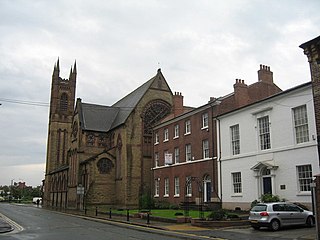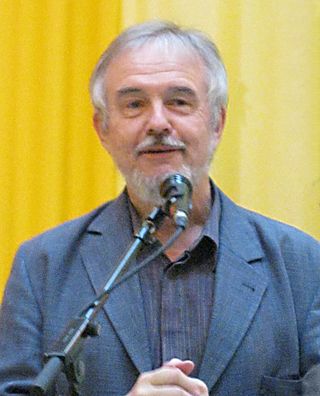The Basel Boys Choir is a boys' choir based in Basel, Switzerland; it grew out of the boys' choir of the Protestant Church of Basel-City, founded by Hermann Ulbrich in 1927. Today the choir is non-denominational. They sing both sacred and secular works. The choir has been under the leadership of Oliver Rudin since 2017.
Petr Eben was a Czech composer of modern and contemporary classical music, and an organist and choirmaster.

Brompton Oratory, also known as the London Oratory, is a neo-classical late-Victorian Catholic parish church in the Brompton area of the Royal Borough of Kensington and Chelsea, neighbouring Knightsbridge, London. Its name stems from Oratorians, who own the building, live nextdoor at the London Oratory, and service the parish. The church's formal title is the Church of the Immaculate Heart of Mary.
Nun ist das Heil und die Kraft, BWV 50, is a choral movement long attributed to Johann Sebastian Bach and assumed to be part of a lost cantata.
Christopher Noel Rawsthorne was a British liturgical and concert organist and composer of music for his own instrument, as well as choral music.

Jeremy Summerly is a British conductor. He was educated at Lichfield Cathedral School, Winchester College, and New College, Oxford. While at Oxford he conducted the New College Chamber Orchestra and the Oxford Chamber Choir. After graduating with a first-class honours degree in music in 1982, he started work as a studio manager for BBC Radio, while pursuing postgraduate research in historical musicology at King's College London. Since 1991 he has been a presenter and reviewer for BBC's Radios 3 and 4, in particular for Radio 4's Front Row, and Radio 3's Record Review.

David Hill, is a choral conductor and organist. Since July 2013, he is Professor Adjunct of Choral Conducting and Principal Conductor of Yale Schola Cantorum at the Yale Institute of Sacred Music.

The Metropolitan Cathedral Church of St David, also known as St David's Cathedral, Cardiff, is a Catholic cathedral in the city centre of Cardiff, Wales, and is the centre of the Archdiocese of Cardiff.

St Mary's Church, or St Mary's Priory, is in the town centre of Warrington, Cheshire, England. It is recorded in the National Heritage List for England as a designated Grade II listed building, and is an active Catholic church. The parish was established and served by Benedictine monks from Ampleforth Abbey, but following the withdrawal of Ampleforth Abbey from the parish in 2012, it was served by the priest from St Benedict's Church, Warrington. From November 2015, the church has been owned and served by priests from the Priestly Fraternity of Saint Peter (FSSP) as a shrine church dedicated to the celebration of the sacraments of the pre-Vatican II form of the Roman Rite. It is well known for the beauty and reverence of its liturgy.

The Bach Choir is a large independent musical organisation founded in London, England in 1876 to give the first performance of J. S. Bach's Mass in B minor in Britain.
Gerd Türk is a German classical tenor.

Gloria in excelsis Deo, BWV 191, is a church cantata written by the German Baroque composer Johann Sebastian Bach, and the only one of his church cantatas set to a Latin text. He composed the Christmas cantata in Leipzig probably in 1742, for a celebration by the university of Leipzig. The composition's three movements all derive from the Gloria of Bach's 1733 Kyrie–Gloria Mass, which the composer would later use as the Gloria of his Mass in B minor.
St Edward's College is a co-educational Catholic school with academy status in the UK located in the Liverpool suburb of West Derby. Founded in 1853 as the Catholic Institute, the college was formerly a boys grammar school run by the Congregation of Christian Brothers, known widely as the Irish Christian Brothers. St Edward's College is heavily oversubscribed every year - being the most oversubscribed school in Liverpool. The College has a reputation as being one of the best schools in North West England.
Alan J. Wilson, is a British composer of church music.

Christen, ätzet diesen Tag, BWV 63, is a church cantata by Johann Sebastian Bach. He composed the Christmas cantata for the First Day of Christmas, possibly in 1713 for the Liebfrauenkirche in Halle. He performed it again for his first Christmas as Thomaskantor in Leipzig, on 25 December 1723.
Nicholas O'Neill is an English composer, arranger, organist and choral director.

Peter Planyavsky is an Austrian organist and composer. He attended the Schottengymnasium. After graduating from the Vienna Academy of Music in 1966 he spent a year in an organ workshop, and has been instrumental in organ-building projects, notably the construction of the Rieger organ in the Great Hall of the Wiener Musikverein. In 1968 he was appointed organist in the Upper Austrian Stift Schlägl, and the following year organist at Vienna's St. Stephen's Cathedral. From 1983 until 1990 Planyavsky was their director of music, with overall responsibility for church music at the cathedral.

Rudolf Lutz is a Swiss organist, harpsichordist, conductor and composer.

Schola Gregoriana Pragensis is an a cappella male voice choir from the Czech Republic, founded in 1987 by David Eben. Their core repertoire consists of Gregorian chant, Bohemian plainchant, and early polyphony, but they also perform modern works including some composed for them.
The Deutscher Chor London (DCL), also known as the German Choir of London, is a London-based amateur mixed-voice choir with a core repertoire of German classical choral pieces and a special interest in contemporary works. The choir was founded in 2009 by its current musical director Barbara Höfling.











